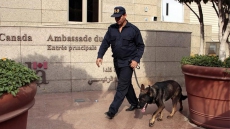WASHINGTON — These are busy days for a group that works to map out the money ties in a U.S. political system covered in special-interest cash.
In an office tower about five blocks from the White House, the team at the Center for Responsive Politics has been hard at work this week, following the money trail.
Its employees helped provide financial context behind a massive, US$1.1 trillion spending bill whose breaks for big business have had critics howling on the left and right.
What was supposed to be an emergency bill to keep government running wound up including benefits for Wall Street; a 1,000-per-cent increase in donation limits to political parties; relaxed safety rules for the trucking industry; and an endangered-species exemption sought by mining and energy companies.
The Washington Post saw a pattern and summed it up in the headline: "Democrats who voted for the (bill) have received twice as much money from the finance industry as the 'no' voters."
Where did they get those figures?
From the CRP, the non-profit group that runs the indispensable resource website OpenSecrets.org. The three-decade-old group sifts through publicly available data, like IRS and federal-election filings, to tell stories about the role of money in U.S. politics.
For this just-passed spending bill, the organization published a slew of details.
—It listed Wall Street donations to lawmakers who voted to undo some of the post-2008 financial reforms, by tacking in a provision that leaves taxpayers on the hook for insuring certain derivatives trades.
—It pointed out one lawmaker who pushed for a rare bird to be exempted from endangered-species protection; one of his top donors is Barrick Gold Corp., the Canadian-based mining company that lobbied heavily against protection for the sage grouse.
—It also listed donations from the trucking sector, which demanded less rest time for drivers and got it.
The centre relies on 22 employees, many of them interns, and gets its funding from about 300 individuals as well as groups including the Ford and Rockefeller foundations.
Given the army of lobbyists and big-money political donors who populate Washington, that makes it the equivalent of a little guerrilla outfit in the battle for transparency.
The group is also a go-to source for information about lobbying in Washington, and happened to release its annual report on lobbying activities last Friday — the same as the Washington Post article.
The No. 1 industry for lobbying: Pharmaceuticals-and-health, with $177 million spent on lobbying, 1,360 lobbyists, 327 company clients, and 803 so-called "revolvers" — people who switch between industry and government jobs.
No. 2 was business associations, followed by insurance, computers-and-Internet and oil-and-gas — with the latter sector disclosing $102.7 million on lobbying, with 777 lobbyists and 467 so-called revolvers.
The centre's executive director says citizens need to know this kind of stuff.
"People need, first and foremost, to have access to the information," said Sheila Krumholz, in an interview in the group's boardroom. That information, though, is only the first step, she says. Getting involved is the next step.
"(Politicians) work for us. As their bosses, we cannot abdicate that responsibility to others — because there are interests that have business before the federal government that would like to shape electoral outcomes, and policy outcomes, and if we're not engaged they'll have more ability to do that in their kind of narrow, parochial, interests and away from the public interest."
Be prepared for slack-jawed stares when you tell people in this office about the political-financing laws in Canada.
The total ban on corporate-and-union donations; the $1,200 limit on personal donations; the publication of donors' names on a single website; the $200,000 limit on third-party spending; the $21 million limit on party spending in the last election — it's like a parallel universe in Canada.
When people talk money in U.S. politics, they start with a different consonant: a "B," as in billions.
The centre estimates about US$3.7 billion was spent in the last midterms alone, with a half-billion in spending from outside groups and $100 million in so-called "dark money" — anonymous sources, donating to non-profit groups regulated not by the federal elections watchdog, but by the tax collectors at the IRS.
"We have a dysfunctional system," Krumholz said.
"It's like a wild-west scenario — almost anything goes."
She's been involved with the centre for 25 years and has seen the tides shift back and forth.
First, transparency standards had been tightened in the post-Watergate era, which included the creation of the Federal Elections Commission. Different donation schemes quickly chipped away at that edifice, she said. Donations from foreign sources caused a scandal in the 1990s. Then came the McCain-Feingold reform bill in 2002 and, finally, decisions like the 2010 Citizens United Supreme Court case.
The practical reality, now, is that corporations and unions can exercise their court-protected speech rights to donate to non-profit advocacy groups that are regulated by the IRS, free of the spending limits and transparency rules imposed by the FEC.
The organization doesn't actually promote campaign-finance reform. In any case, Krumholz says, Americans are proud of their First Amendment rights and would err on the side of free speech.
But she calls the current trajectory worrisome, and foresees one of two outcomes.
Either the status quo continues: "Which could become dangerous because, at some point, I think the country would no longer really be legitimately called a democracy. And further there could be serious strife in our country, due to inequities and a lack of representation."
Or people can get informed, get involved, and demand change. She uses an old dinner-table metaphor to make the case for greater citizen participation in democratic decision-making.
"You're either at the table — or on the menu," Krumholz says.
"And people have ceded their spot at the table. There are thousands of corporations, unions, trade associations, organizations that understand the stakes — and are ready, trying, to wedge the door open further to their lobbyists, their interests, their access, their ability to influence the process."




